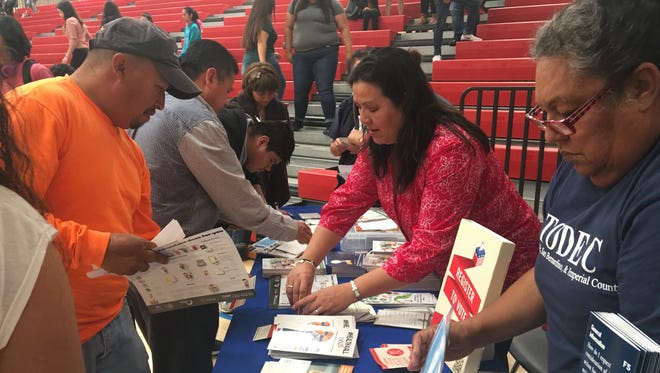Calif. Dream Act applications plummet as immigration fears grow

PALM SPRINGS, Calif. — Officials believe that fear and confusion over federal immigration policy changes have discouraged California students from applying to the state Dream Act, which allows undocumented students to receive state financial aid and pay in-state tuition.
Applications to the California Dream Act are down more than 60% this year compared with last year, with only 17,819 applicants as of Friday compared with 46,731 last year, according to Patti Colston, communications manager for the California Student Aid Commission.
Colston said that while the student aid commission hasn't conducted a scientific survey to determine why undocumented students aren't filling out the Dream Act applications this year, anecdotally they've heard that students are afraid of sharing their information.
"The numbers are down so much that we believe there may be some confusion with the California Dream Act and DACA," Colston said.
Confusion mounts as immigrants react to Trump memos
'We have laws': Trump supporters in Arizona cheer new guidelines on deportation
DACA, or the Deferred Action for Childhood Arrivals program, started under President Obama through executive action in 2012 and allows eligible undocumented immigrants who came to the U.S. as children to obtain work permits and postpone deportation for up to two years at a time. President Trump's rhetoric against illegal immigration and other immigrants — while seen as a fulfillment of campaign promises among Trump's supporters — has spurred fear and anxiety in predominantly immigrant communities like the Coachella Valley.
On Tuesday, the Department of Homeland Security issued two policy memos instructing Customs and Border Protection and Immigration and Customs Enforcement agents to identify and deport every undocumented immigrant they encounter. While the memos still prioritize undocumented immigrants convicted of crimes — similar to the Obama administration's policies — the new policy memos demonstrate a hard-line attitude against all undocumented immigrants by widening prioritization to people arrested but not convicted of crimes and people deemed a public safety threat.
The Department of Homeland Security website states that DACA recipients will not be affected by the new policies, but many recipients are wary of further changes to immigration policies, especially following the recent detainment of a DACA recipient in Washington state during an immigration raid. That fear may have spilled into California's separate Dream Act.
But California education officials want students to know that they will protect student information.
"This is funded by state funds. All of the data is processed here, and we do not send any data to the federal government," Colston said, adding that Dream Act applicants do not need to be DACA recipients.
Since its implementation during the 2013-14 school year, California Dream Act recipients have received $71.4 million in state grants and scholarships, according to a September report made to the California Student Aid Commission. More money is available, but only 67% of undocumented students who apply and receive an offer from the student aid commission accept the award, the report states.
State Superintendent Tom Torlakson issued a statement Tuesday urging students to apply before the March 2 deadline.
“It would be a shame if fear or confusion keeps students from applying for financial aid that they have earned and they deserve,” Torlakson said in a statement.
Follow Kristen Hwang on Twitter: @khwangreports